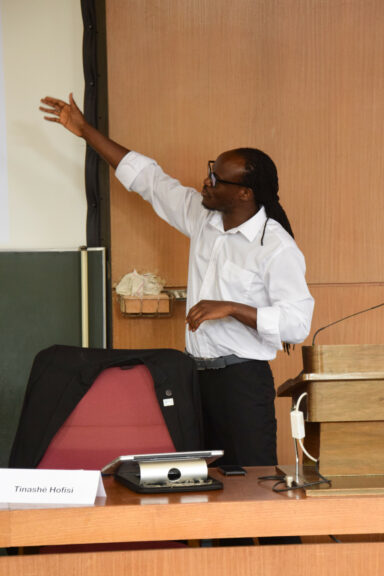On 16 July 1969, Zambian Chief Justice James John Skinner and High Court Judge Ivor Evans barricaded themselves in the Zambian High Court building in Lusaka. Around 500 members of the Zambian Youth Service had stormed the building. Within two months, the chief justice and several other judges had resigned. In the same year, several judges in Malawi resigned led by Chief Justice Peter Watkin-Williams. In Zimbabwe, a group of five hundred war veterans disrupted the Supreme Court for an hour on 24 November 2000. Chief Justice Anthony Gubbay was forced into early retirement within three months.
On June 30 Tinashé Hofisi discussed these incidents and their significance in respect of courts’ legitimacy, their independence and how this implicates executive power at FAU. Many constitutional reform exercises now emphasize strengthening independence through provisions including establishing a German-style Constitutional Court. Tinashé explores the underlying political conditions which enable courts of this nature to act as an effective check on executive power. The lecture lay out the main finding that strong judicial review without a concordantly high level of legitimacy may inadvertently aid power grabs by the executive.
About Tinashé Hofisi:
David Tinashé Hofisi is a doctoral candidate at the University of Wisconsin-Madison Law School. His research examines the emergence of constitutional courts in common law Africa. Tinashé was a constitutional litigator with the Zimbabwe Lawyers for Human Rights for seven years with several cases in the Constitutional Court. He graduated with an LLM from Loyola University, Chicago and is a Mandela Washington Fellow under the Young African Leaders Initiative. He is also an IFES Manatt Fellow. Tinashé holds certificates in Constitution-building in Africa and Strategic Human Rights Litigation from the Central European University in Hungary. Since the fall of 2020, he has been a lecturer at the Centre for Law, Society and Justice, where he developed an interdisciplinary course on courts, constitutionalism and human rights.

On 16 July 1969, Zambian Chief Justice James John Skinner and High Court Judge Ivor Evans barricaded themselves in the Zambian High Court building in Lusaka. Around 500 members of the Zambian Youth Service had stormed the building. Within two months, the chief justice and several other judges had resigned. In the same year, several judges in Malawi resigned led by Chief Justice Peter Watkin-Williams. In Zimbabwe, a group of five hundred war veterans disrupted the Supreme Court for an hour on 24 November 2000. Chief Justice Anthony Gubbay was forced into early retirement within three months.
On June 30 Tinashé Hofisi discussed these incidents and their significance in respect of courts’ legitimacy, their independence and how this implicates executive power at FAU. Many constitutional reform exercises now emphasize strengthening independence through provisions including establishing a German-style Constitutional Court. Tinashé explores the underlying political conditions which enable courts of this nature to act as an effective check on executive power. The lecture lay out the main finding that strong judicial review without a concordantly high level of legitimacy may inadvertently aid power grabs by the executive.
About Tinashé Hofisi:
David Tinashé Hofisi is a doctoral candidate at the University of Wisconsin-Madison Law School. His research examines the emergence of constitutional courts in common law Africa. Tinashé was a constitutional litigator with the Zimbabwe Lawyers for Human Rights for seven years with several cases in the Constitutional Court. He graduated with an LLM from Loyola University, Chicago and is a Mandela Washington Fellow under the Young African Leaders Initiative. He is also an IFES Manatt Fellow. Tinashé holds certificates in Constitution-building in Africa and Strategic Human Rights Litigation from the Central European University in Hungary. Since the fall of 2020, he has been a lecturer at the Centre for Law, Society and Justice, where he developed an interdisciplinary course on courts, constitutionalism and human rights.